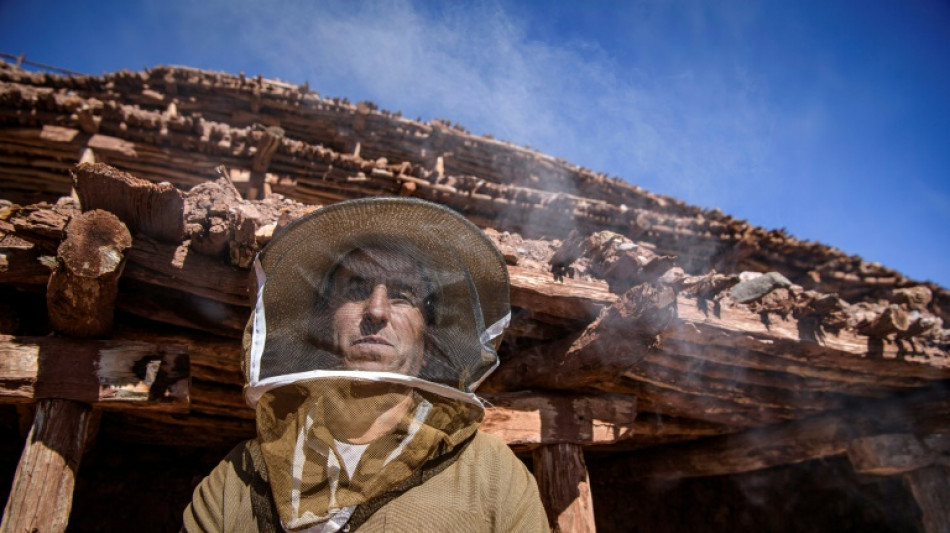
-
 Renowned Holocaust survivor Margot Friedlaender dies at 103
Renowned Holocaust survivor Margot Friedlaender dies at 103
-
Woods, 16-year-old Charlie, misses out in US Open qualifier

-
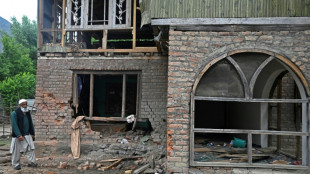 Pakistan says India has put neighbours 'closer to major conflict'
Pakistan says India has put neighbours 'closer to major conflict'
-
On patrol for jihadists with Mauritania's camel cavalry
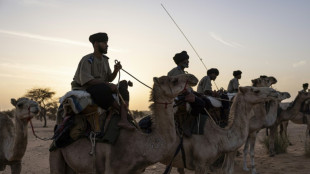
-
 France, Poland sign treaty with mutual defence pledge
France, Poland sign treaty with mutual defence pledge
-
NATO chief seeks defence spending at 5% of GDP by 2032: Dutch PM

-
 La Rochelle head coach O'Gara suspended for five weeks
La Rochelle head coach O'Gara suspended for five weeks
-
Measles roars back in the US, topping 1,000 cases

-
 Fulham boss Silva refuses to rule out Saudi switch
Fulham boss Silva refuses to rule out Saudi switch
-
From Chicago to Chiclayo: Peruvian town hails adoptive son and pope

-
 Ivorian women fight FGM with reconstructive surgery
Ivorian women fight FGM with reconstructive surgery
-
Pedersen wins opening stage of Giro d'Italia in Albania

-
 Stocks mixed despite hopes for US-China tariff talks
Stocks mixed despite hopes for US-China tariff talks
-
US, Swiss agree to speed up tariff talks

-
 Trump floats cutting China tariffs to 80% ahead of trade talks
Trump floats cutting China tariffs to 80% ahead of trade talks
-
Pedersen wins opening stage of Giro d'Italia

-
 Marc Marquez sets Le Mans lap record in French MotoGP practice
Marc Marquez sets Le Mans lap record in French MotoGP practice
-
Jungle music: Chimp drumming reveals building blocks of human rhythm

-
 Guardiola tells Man City stars to question their hunger after troubled season
Guardiola tells Man City stars to question their hunger after troubled season
-
Putin, Xi, Steven Seagal and missiles: Russia's Red Square parade

-
 Trump suggests lower 80% China tariff ahead of Geneva trade talks
Trump suggests lower 80% China tariff ahead of Geneva trade talks
-
Arteta wants Arsenal to use Liverpool guard of honour as title fuel

-
 Stocks lifted by hopes for US-China talks
Stocks lifted by hopes for US-China talks
-
Putin hails troops in Ukraine as allies attend WWII parade

-
 UK, northern European nations support Ukraine 30-day ceasefire: Norway PM
UK, northern European nations support Ukraine 30-day ceasefire: Norway PM
-
Activists hold 'die-in' protest at Soviet monument in Warsaw

-
 Trump suggests lower China tariff, says 80% 'seems right!'
Trump suggests lower China tariff, says 80% 'seems right!'
-
Alonso confirms exit from Leverkusen at end of season

-
 Maresca ready for Chelsea's 'huge' Newcastle test
Maresca ready for Chelsea's 'huge' Newcastle test
-
Alcaraz, Sabalenka cruise to wins at the Italian Open

-
 Swiss seize window of opportunity on Trump tariffs
Swiss seize window of opportunity on Trump tariffs
-
Amorim admits Man Utd 'problems' despite reaching Europa League final

-
 New Pope Leo XIV has mixed record on abuse: campaigners
New Pope Leo XIV has mixed record on abuse: campaigners
-
Xabi Alonso confirms exit from Bayer Leverkusen at season's end

-
 From blockades to ballots: Serbian students confront government
From blockades to ballots: Serbian students confront government
-
Kyiv's EU allies endorse tribunal to try Russian leaders

-
 Two men found guilty of chopping down iconic UK tree
Two men found guilty of chopping down iconic UK tree
-
Tennis, Twitter and marinated fish: Things to know about Pope Leo

-
 Liverpool's Salah voted Football Writers' Player of the Year
Liverpool's Salah voted Football Writers' Player of the Year
-
Pakistan says India has brought neighbours 'closer to major conflict'
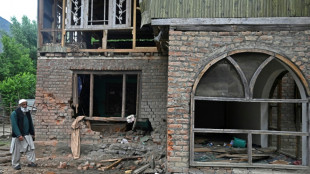
-
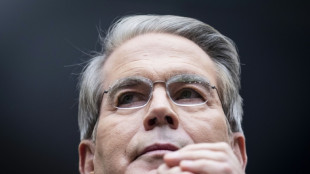 Stocks lifted by hopes for US-China talks after UK deal
Stocks lifted by hopes for US-China talks after UK deal
-
Putin hails troops fighting in Ukraine as foreign leaders attend parade

-
 Howe urges Newcastle to fulfil Champions League expectation
Howe urges Newcastle to fulfil Champions League expectation
-
Weary border residents in Indian Kashmir struggle to survive
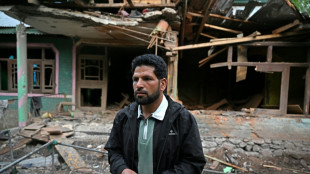
-
 Leo XIV says Church must fight 'lack of faith' in first mass as pope
Leo XIV says Church must fight 'lack of faith' in first mass as pope
-
Liverpool boss Slot fears replacing Alexander-Arnold will be a tough task

-
 British Airways owner unveils big Boeing, Airbus order
British Airways owner unveils big Boeing, Airbus order
-
IPL suspended for one week over India-Pakistan conflict

-
 Slot says all at Liverpool sad to see Alexander-Arnold go
Slot says all at Liverpool sad to see Alexander-Arnold go
-
Leo XIV celebrates first mass as pope in Sistine Chapel


Stung by drought, Morocco's bees face disaster
Morocco's village of Inzerki is proud to claim it has the world's oldest and largest collective beehive, but instead of buzzing with springtime activity, the colonies have collapsed amid crippling drought.
Beekeeper Brahim Chatoui says he has lost almost a third of his hives in just two months -- and he is not alone.
"At this time of year, this area would normally be buzzing with bees," said Chatoui, sweating under a blazing springtime sun. "Today, they're dying at a terrifying rate."
The North African kingdom has seen a dramatic spike in mass die-offs of the critical pollinators, a phenomenon called "colony collapse disorder".
Worldwide, experts say such sudden mass deaths of bees are often linked to the destruction of nature and the rampant use of pesticides.
But authorities in Morocco say these collapses are caused by the worst drought to hit the country in 40 years, which has decimated the plants on which bees rely for food.
- 'Unprecedented' spike -
The crisis is so acute that the government released 130 million dirhams ($13 million), to support beekeepers and investigate the cause of the bee deaths.
Morocco's National Food Safety Office, which carried out the investigation, ruled out disease as a reason.
Instead, it blamed the "unprecedented" spike in hive collapses on an intense drought driven by climate change.
Inzerki's unique collective beehive sits on a sunny hillside in the heart of the Arganeraie Biosphere Reserve, a UNESCO-protected 2.5-million-hectare region, some 415 kilometres (260 miles) southwest of the capital Rabat.
The complex is striking: A five-storeyed structure of wooden struts and dry mud stretch along a hillside, each compartment home to a cylindrical wicker hive, covered with a mix of earth and cow dung.
Experts say it is the oldest traditional, collective beehive in the world, dating back to 1850, but today it is under threat amid a changing climate.
"This year we hope for rain, because I have lost 40 hives so far," Chataoui said.
Bee expert Antonin Adam, who has studied the insects in southwestern Morocco, also blamed the collapse on the drought.
But he added the problem may have been exacerbated by "the bees' vulnerability to diseases, nomadic pastoral practices, intensive agriculture and the country's desire to increase its honey production".
That desire is clearly visible in agriculture ministry figures.
Honey output has risen by 69 percent in a decade, from 4.7 tonnes in 2009 to almost eight tonnes in 2019, generating revenues of over 100 million euros.
But it is not only Inzerki's apiary that is in trouble.
Mohamed Choudani, of the UAM beekeepers union, said the crisis was hitting bee populations across the country.
Last summer, Morocco's 36,000 beekeepers were managing some 910,000 hives, up by 60 percent since 2009, according to official figures.
But Choudani said that since last August, 100,000 colonies had been lost in the central region of Beni Mellal-Khenifra alone.
Bees and other pollinators are vital for the reproduction of more than three-quarters of food crops and flowering plants.
The UN's Food and Agriculture Organisation (FAO) say bees play an "essential role... in keeping people and the planet healthy", with the UN saying they "serve as sentinels for emergent environmental risks, signalling the health of local ecosystems".
- 'Exceptional legacy' -
For the villagers of Inzerki, the collapse of hives is an ecological and economic disaster -- but also a crisis for their unique heritage.
Chatoui, the beekeeper, said many Inzerki residents can't afford to revive the hives they have lost.
"Some families have decided just to give up on beekeeping completely," he said.
The hives at Inzerki are in trouble. Parts of the structure, recently listed as a national heritage site, are sagging.
Geographer Hassan Benalayat says the neglect is due to several factors on top of climate change, including the arrival of modern agriculture and a general exodus from the countryside.
Around 80 families in the village once kept bees. Today there are less than 20.
"It's urgent to keep this exceptional legacy alive," Benalayat said.
Chatoui and other villagers have set up an association to restore the structure, as well as planting herbs for the bees that are better able to tolerate hot and arid conditions.
"The situation is critical, but that doesn't mean I'm giving up," Chatoui said.
"The aim isn't to produce honey, but to protect the hives and make sure the bees survive until better days."
Y.Nakamura--AMWN
